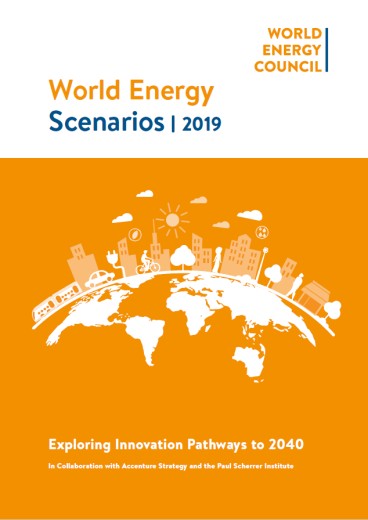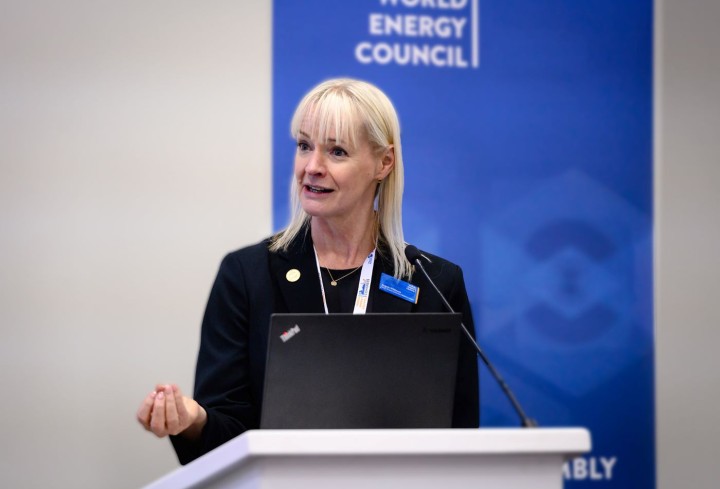HYDROGEN INNOVATION FORUM
On the 19th and 20th of November, the World Energy Council organised the Hydrogen Innovation Forum, kindly hosted by ENA in London and moderated by the Council’s CEO and Secretary General, Angela Wilkinson.
“MORE PROJECTS, MORE AMBITIOUS PROJECTS”
The Innovation Forum convened hydrogen experts from across the globe to identify viable business cases for clean hydrogen. In the course of the two-day workshop, clean hydrogen was repeatedly referred to as renewables’ flexible friend. Indeed, clean hydrogen can contribute to integrate renewables, store energy over long periods of time as well as decarbonising sectors which electrification may not be able to reach. While this confirmed the findings of the hydrogen-focused Insights Brief released in June by the Council, participants also moved past an either-or mentality between green and blue hydrogen. In the optic of the energy transition, they proposed a mix between the two, with the aim to push the infrastructure investment required for widespread deployment of clean hydrogen. Taking advantage of the technological readiness for clean hydrogen production, costs can be driven down by increasing the volume and automating the processes of production.
“HOW” NOT “SHOULD”
In exploring viable business cases for the deployment of clean hydrogen and hydrogen-based fuels, participant investigated along two axes: consumer engagement and structure of hydrogen production.

The diversity of experts in the room highlighted very different approaches to what a viable business case looks like. Some believed that consumer engagement is key, while others believe the consumer should remain undisturbed by the process, benefiting from a seamless transition to clean hydrogen. Concerns for the market structure revolved around a centralised/decentralised production model.
Proponents of potential export opportunities suggested a preference for centralised models, whereas advocates for local development opportunities and strong carbon abatement emissions preferred a decentralised, local approach.
On the one hand, proposed centralised models relied to varying degrees on government support and industrial cooperation on an international scale to develop supply chains where consumers are highly engaged or, on the contrary, a deployment geared solely towards industrial use.
On the other hand, participants’ decentralised models led to scenarios where hydrogen is deployed to decarbonise unique niche products where there is high consumer engagement (decarbonised coffee production in Ethiopia, for example). They also led to Hydrogen Hubs where hydrogen is thoroughly deployed albeit on a restricted, localised scale.
Interestingly, every case presented the diverging needs and approaches to hydrogen, covering geographical challenges induced by the access to renewables and readiness of transport to consumption locations. What’s more, a particular focus was given to the social dimension of hydrogen’s impact on jobs and industry, stressing its importance with every model proposed. Throughout the event, experts exchanged experience and insights drawn from their respective endeavours. The true success of the Innovation Forum appeared when participants identified a crucial gap in global hydrogen efforts: they need to see what other are doing.

FROM INSIGHTS TO IMPACT
As part of the World Energy Council’s exploration of credible decarbonisation solutions, this Innovation Forum served to launch the Hydrogen Global Initiative. This initiative steps into a space not yet filled for hydrogen in the energy sector: that of a platform facilitating exchanges and accelerating the deployment of clean hydrogen for decarbonisation of energy systems.
The primary goal of Hydrogen Global is to aggregate the scattered efforts of individual projects. By doing so, the Council creates a global community of hydrogen actors and provides them with a platform to continue sharing their expertise. Hydrogen Global collects participation in the form of a charter to give weight to the collective commitment of its signatories. It boosts individual signals by clearly articulating the steps to take to make clean hydrogen successful.
Geared for impact, this initiative avoids the pitfall of normative reporting by directly addressing the experts and helping them share the practicalities and challenges of working with clean hydrogen. While the World Energy Council provides this platform for acceleration, it is the members of Hydrogen Global who will own and drive this success through their participation.
This industry-leading initiative already counts two signatories, SWEN and SNAM, which have attached their pre-existing investments to Hydrogen Global, collectively announcing nearly 1 billion euros invested in hydrogen.






